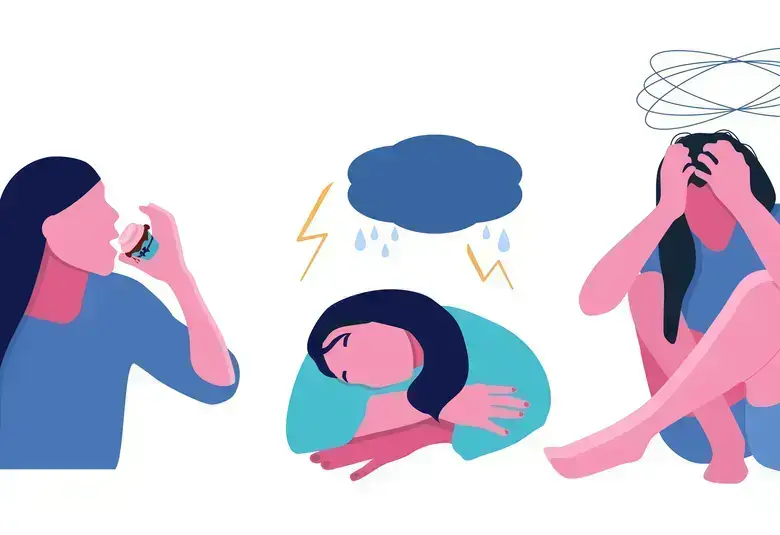Whether baseline severity of major depressive disorder (MDD) influences the efficacy of antidepressants is an important clinical question. We now have a clear answer: in the homogeneous population of Japanese patients, it does not. All patients benefit. How far this finding can be generalized to other groups with major depression is another question. But there is consensus on the need for personalized treatment.
주요우울장애(MDD)의 기저 중증도(baseline severity)가 항우울제의 효능에 영향을 미치는지 여부는 중요한 임상적 질문입니다. 현재 우리는 이에 대한 명확한 답을 얻었습니다. 일본의 동질적 인구집단에서 이는 영향을 미치지 않았으며, 모든 환자에게 효과를 보였습니다. 그러나 이 연구 결과를 다른 주요우울장애 환자들에게 얼마나 일반화하여 적용할 수 있는지는 또 다른 문제입니다. 하지만, 개인 맞춤형 치료가 필요하다는 점에 있어서는 의견 일치를 이루고 있습니다.
The baseline severity of MDD does not influence the efficacy of acute treatment with antidepressant treatment. Once diagnosed as having MDD, patients who are at the mild end of the dimension benefit as much from treatment as those with severe disease.
MDD의 기저 중증도는 항우울제의 단기 치료 효능에 영향을 미치지 않습니다. 일단 MDD로 진단을 받았으면, 경증의 경계에 있는 환자들도 중증도가 심한 환자들만큼이나 치료를 통해 이익을 얻습니다
That is the clear take-home message from the meta-analysis of individual patient data presented at EPA 2019 by Professor Andrea Cipriani, Warneford Hospital, University of Oxford, UK.
이는 영국 옥스퍼드대학교 워너퍼드병원 안드레아 시프리아니(Andrea Cipriani) 교수가 EPA 2019에서 제시한 개별 환자 데이터 메타 분석으로부터 얻어진 명확한 메시지입니다.
The model that best fitted the data showed that the interaction between baseline severity and treatment effect was far from statistically significant, with a p value of 0.49.1
데이터에 가장 적합한 한 모델을 살펴보면 기저 중증도와 치료 효과 간의 관계에서는 p 값이 0.49로서 통계적 유의성이 낮습니다.1
The meta-analysis included data from around 2,300 patients, with a mean age of 40 and a mean score on the Hamilton scale of 22-23, who were treated for 6-8 weeks. The proportion of female patients – 52% -- was lower than expected in routine practice.
시프리아니 교수가 제시한 메타 분석에는 평균 연령 만 40세, 해밀턴 우울증 평가 척도 평균 점수 22~23점, 치료 기간 6~8주에 해당하는 환자 약 2,300명에 관한 데이터가 활용되었습니다. 이중 여성 환자는 52%로서 일반 사례에 비해 비율이 낮았습니다.
Patients at the mild end of MDD gain as much from treatment as those with severe disease
MDD 중증도가 경미한 환자들도 중증도가 심한 환자들만큼이나 치료를 통해 효과를 얻습니다
Earlier studies of severity had flaws
중증도에 관한 이전 연구들에는 결점이 있습니다
Professor Cipriani and colleagues believe their work is an advance on earlier studies which had less statistical power and accounted for missing data by carrying forward values from the last observation – an approach which they say is no longer adequate.
시프리아니 교수와 연구진은 이 연구가 이전 연구들로부터 한 단계 발전한 연구 성과라고 믿고 있습니다. 이전 연구들은 통계적 검정력이 부족하고 결측값을 최종관찰 값 준용(LOCF)으로 처리하고는 했는데, 그들은 이런 방식은 더 이상 적절한 접근법이 아니라고 말했습니다.
Also, one of the four studies included patients with minor depression, ie people who did not meet the criteria for MDD. Minor depression, he emphasized, is different from meeting the diagnostic criteria for MDD but being less severely affected.
또한 4건의 연구 중 1건에서는 경도 우울증 환자들, 즉 MDD 기준을 충족하지 못한 사람들을 포함하였습니다. 시프리아니 교수는 경도 우울증은 MDD 진단 기준을 충족하는 수준과는 다른 것으로, 질환의 중증도가 낮은 것이라고 강조했습니다.
In the recent meta-analysis, appropriate sensitivity analyses were carried out. The initial model was based on four randomised controlled trials (RCTs), and tested using raw data and data adjusted for potential confounders, notably age and gender. The model was then applied to a further two RCTs; and the findings were replicated.
최근 진행한 메타 분석에서는 적정 민감도 분석(appropriate sensitivity analysis)을 실시했습니다. 초기 모델은 무작위 대조군 연구(RCT) 4건으로 구성되었으며, 원 데이터, 그리고 연령 및 성별 등 잠재적 교란 변수들을 조정한 데이터 각각을 이용해 시험을 진행했습니다. 이후 이 모델을 추가적으로 실시한 2건의 RCT에 적용하였는데, 같은 결과가 재현되었습니다.
Clinical features and patient preferences – both should guide choice of treatment
치료 방법의 선택에는 임상적 특성과 환자의 선호도가 모두 고려되어야 합니다
Robust but limited findings
강건하지만 제한적인 연구 결과
Including only time points at which all studies reported outcomes made no difference to the conclusions of the meta-analysis. Neither did excluding studies in which MADRS scores had to be converted into scores on the Hamilton scale so that there was only one outcome measure across all trials. Hence the conclusions of the meta-analysis can be regarded as robust.
모든 연구가 성과를 보고한 시점만을 포함하는 것은 메타 분석의 결론에 아무런 차이를 가져오지 못했습니다. 또한 모든 임상 시험의 치료결과 측정 기준(outcome measure)을 한 가지로 통일하기 위해 MADRS 점수를 해밀턴 우울증 평가 척도 점수로 변환해야 했던 연구를 배제한 것도 결론에 아무런 영향을 주지 않았기 때문에, 모든 임상에 대해 한 가지 척도만이 분석되었습니다. 따라서 메타 분석의 결론은 강건하다고 볼 수 있습니다.
However, there are important caveats. While the study was technically robust, the analysis involved data from only six RTCs; all patients were on monotherapy; and – importantly -- they were all conducted in Japan.
그러나 여기에는 주의할 측면이 있습니다. 연구가 기술적으로 강건한 것은 사실이지만, 분석에 활용된 데이터는 단 6건의 RTC에서 얻은 자료입니다. 이 RTC에서는 모든 환자들에게 단일 요법이 적용되었으며, 더욱이 중요한 사실은 이 연구들이 모두 일본에서 진행되었다는 점입니다.
Japan was chosen because of its homogeneous population and because of a generally favorable approach to comprehensive release of data at the level of individual patients.
일본이 연구 지역으로 선택된 이유는 인구집단의 동질성, 그리고 환자 개인의 차원에서 데이터를 포괄적으로 공개하는 것이 일반적으로 용이하기 때문입니다.
The potential lack of generalizability of the new analysis suggests caution in urging that current guidelines such as those of NICE and APA should be updated in the light of its findings.
이 새로운 분석의 일반화 가능성은 잠재적으로 낮으므로, 이 연구 결과를 고려해 NICE 및 APA 등의 기존 가이드라인을 업데이트할 것을 촉구하는 것은 주의할 필요가 있습니다.
Matching treatments to individuals is the essence of a modern approach: we treat patients, not averages
개인 맞춤형 치료는 현대적 치료 방식의 핵심 - 평균이 아닌 환자 개인에 대한 치료
But there is a kind of corroboration from a meta-analysis of cognitive behavioral therapy (CBT) for depression. This again used data from individual patients, and it again found that MDD patients can expect benefit from CBT across the wide range of baseline severity.2
그런데 우울증을 위한 인지행동치료(CBT)에 대한 메타 분석에서도 이를 입증하는 근거가 제시되었습니다. 이 경우에도 환자 개인별 데이터가 활용되었으며, 다양한 기저 중증도의 MDD 환자들이 CBT에서 효과를 얻을 수 있다는 결론을 다시 한 번 보여주었습니다.2
Why is depression different?
우울증은 왜 다른가?
An interesting question is why baseline severity seems not to influence the efficacy of antidepressants or CBT for depression while severity does modulate the efficacy of antipsychotics and agents used in autism and mania.3
여기서 흥미로운 의문은, 기저 중증도에 따라 자폐증이나 조증 환자에게 사용되는 항정신병 약물 및 물질의 효능은 달라지는 반면, 왜 항우울제 또는 우울증을 위한 CBT의 효능에는 영향을 미치지 않느냐는 것입니다.3
One factor may be the heterogeneity of patients with an MDD diagnosis; and another may be that the effect size in treating depression is less than, for example, in schizophrenia.
이는 MDD 진단을 받은 환자들의 이질성 때문일 수도 있고, 우울증 치료의 효과 크기가 다른 질환, 예를 들면 조현병의 효과 크기보다 작기 때문일 수도 있습니다.
Patient preferences need to be part of the picture
환자들의 선호도 역시 고려되어야 합니다
Professor Cipriani’s passion is to advance personalized treatment in psychiatry. Ideally, choice of treatment would reflect factors such as gender, co-existing anxiety, duration of symptoms, family history, and cardiac risk.
시프리아니 교수는 정신의학 분야에서 개인 맞춤형 치료의 발전에 열의를 보이고 있습니다. 치료 방법의 이상적인 선택 방식은 성별, 수반되는 불안감, 증상 발생 기간, 가족력, 심장 질환 위험 등의 요인을 반영하는 것입니다.
It should also take into account patient preferences. In ongoing work in Oxford, patients are being asked to use a sliding scale to rate how concerned they are to avoid specific adverse events such as insomnia, nausea, sedation, tremor and weight gain. All are relevant to selection of the most appropriate antidepressant therapy.
또한 환자의 선호도도 함께 고려해야 합니다. 옥스퍼드대학교에서 현재 진행 중인 연구에서는 환자들에게 슬라이딩 스케일(sliding scale)을 이용해 불면증, 메스꺼움, 진정, 떨림, 체중 증가 등 특정한 부정적 증상을 피하기 위해 얼마나 신경 쓰고 있는지 등급을 매기도록 하고 있습니다. 이러한 요인은 모두 최적의 항우울제 치료 방식을 선택과 연관되어 있습니다.
본 자료는 Global Lundbeck 의학부에서 선별한 콘텐츠이며, 한국룬드벡의 의견과 다를 수 있습니다




